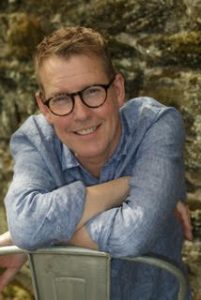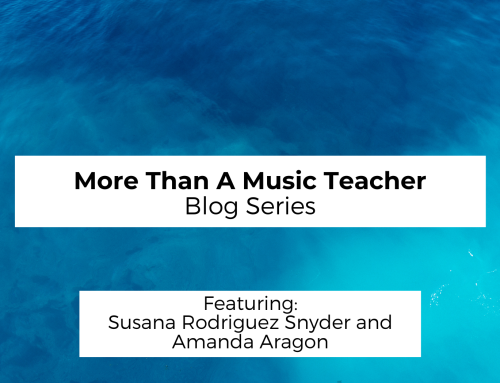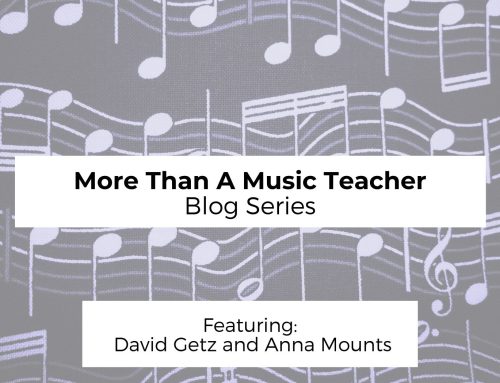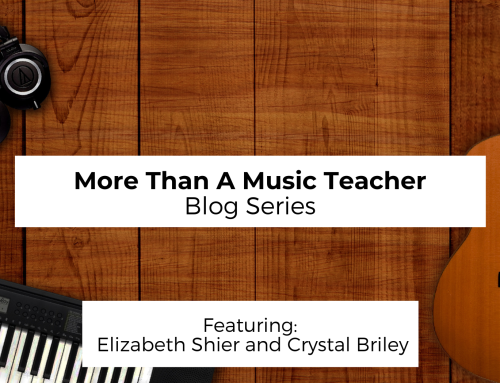For the next installment of our “Music Beyond the Classroom” series, we sat down with composer, Richard Taylor. Richard studied composition at the Royal Northern College of Music in the UK, and has been working as a composer ever since. His credits include classical commissions and music written for the theater. Check out the music from his West End musical, Flowers for Mrs. Harris (video below), and his collaboration with an R&B artist, Shaquille Rayes (video at the bottom of the page). Thank you for sharing your wisdom with us, Richard!
Table of Contents
Tell us about your life as a composer/musician. What does your day-to-day work look like?
 The wonderful, and exasperating, thing about my life is no day or week is ever the same. It’s wonderful because every day can be an adventure, and there’s no chance of getting bored. But exasperating because that is also very tiring, and draining. And there’s no safety-net, which for a natural-born-worrier like me, is something I never quite get used to (despite having done this for a lot of years!). I spend 50% of my time, probably, writing to commission. So that’s at home, at a desk with a piano to hand. The rest of my time can be in rehearsals for a theatre production (I compose scores for plays sometimes), or I might be doing workshops in schools for any number of organizations such as orchestras or opera companies. I love leading joint composition workshops – making music as a group, and generally demystifying the composition process. Reminding people it’s not full of right notes and wrong notes, it’s about self-expression. If it feels right, it therefore is right. My commission work might be for orchestras, choirs, or it might be stage work. I’ve also written for TV and film. So I enjoy a very varied life. I recently heard the expression ‘portfolio career’, which is probably a very established term, but was new to me. I was delighted by it, as I’d always in some way considered what I do (so many different strands to my career) as a failure to specialize. But ‘portfolio career’ is a term that absolutely validates my decision to spread my wings as widely as I can.
The wonderful, and exasperating, thing about my life is no day or week is ever the same. It’s wonderful because every day can be an adventure, and there’s no chance of getting bored. But exasperating because that is also very tiring, and draining. And there’s no safety-net, which for a natural-born-worrier like me, is something I never quite get used to (despite having done this for a lot of years!). I spend 50% of my time, probably, writing to commission. So that’s at home, at a desk with a piano to hand. The rest of my time can be in rehearsals for a theatre production (I compose scores for plays sometimes), or I might be doing workshops in schools for any number of organizations such as orchestras or opera companies. I love leading joint composition workshops – making music as a group, and generally demystifying the composition process. Reminding people it’s not full of right notes and wrong notes, it’s about self-expression. If it feels right, it therefore is right. My commission work might be for orchestras, choirs, or it might be stage work. I’ve also written for TV and film. So I enjoy a very varied life. I recently heard the expression ‘portfolio career’, which is probably a very established term, but was new to me. I was delighted by it, as I’d always in some way considered what I do (so many different strands to my career) as a failure to specialize. But ‘portfolio career’ is a term that absolutely validates my decision to spread my wings as widely as I can.
I love leading joint composition workshops – making music as a group, and generally demystifying the composition process. Reminding people it’s not full of right notes and wrong notes, it’s about self-expression.
What led you to pursue composition?
I began playing piano when I was three years old. My older sister had wanted piano lessons (I think she lasted about four lessons before moving onto the next thing…), so in order to enable her wishes my parents re-housed an old piano our neighbours happened to be discarding. I don’t know what freak-of-nature I was then, but I didn’t doodle or hammer, I just played: melodies I picked up from the television, hymns from Sunday school. That sort of thing. My parents didn’t find a piano teacher to take me on until I was five, but by that time I was already making up my own tunes and finding my very natural way around the keyboard. Once I did start learning properly I infuriated my teacher by constantly going ‘off-piste’ and playing all sorts of things that weren’t on the page in front of me. As far as I was concerned why did I have to suffer the boring counter-motion scales of “The Farmer Ploughs The Field” (or whatever tedious piece I was being asked to play), when I could have much more fun with a bit of boogie-woogie? Luckily I didn’t give up learning altogether, and I managed to separate my two piano-lives into ‘official’ pieces (which I had to practice), and ‘made-up’ pieces (which I regarded as my treat at the end of practice!). I guess that’s when the composer in me was born. I juggled those two musical hats until I was leaving high school, and needed to decide whether to study piano, or composition, at Conservatoire. Since I still hadn’t learned not to become beyond-bored of practise, I went for composition!
Who were the biggest mentors in your field?
My main musical mentors were early piano teachers, particularly my second teacher throughout my teens. He was a some-time concert pianist but his performance nerves eventually overwhelmed him and he retired from the concert platform in order to teach. But he was a showman, very camp, and I adored his totally pink piano room. He encouraged me to play brilliantly florid show pieces, flinging my arms into the air and generally delighting the audiences at old-people’s-home, and such like, where I was trotted out to give recitals. But along with this was a deeply emotional connection that he had with music, which he instilled in me. His rich, romantic repertoire was full of expression and meaning, and into each key change, each teasing suspension or passing note, he imbued a sense of passion and drama. I didn’t just play the music, I FELT it. That went into my very core, and as a composer I still need to live and breathe every note. Some composers can be very technical. I can’t. Technique is there, of course, and I employ that very strictly and obsessively, but the springboard of invention, for me, is emotional connection. I also had a high school music teacher who would really rather have been a drama teacher, I suspect. He loved writing the school musicals, and always found a way to involve me. I developed a love for the stage, and the power of music when accompanying dramatic action. It’s why I adore writing music for plays, where the music is to remain very much ‘under the radar’, yet enhance enhance enhance! The subtle surreptitious ability music has to work intravenously and create mood and real emotional heft. When I started out, professionally, I didn’t have any mentors, I was really going into the profession blind. It meant I felt my way, and made a lot of mistakes, but had enough passion so people forgave me and I was offered second chances. The Principal of the music conservatoire I attended (the Royal Northern College of Music in the UK) heard a piece of orchestral music I’d written whilst studying and secured my first commission after graduation. One thing led slowly to another.
I didn’t just play the music, I FELT it. That went into my very core, and as a composer I still need to live and breathe every note.
What is the hardest part of your job?
Many might think discipline, not wasting time, but actually I don’t have a problem with that. This is all I’ve ever done, work as a composer, so I’ve learned to structure my day and I regard it as a proper job. I work at a desk, I lead pretty-much office hours. The hardest part is holding my nerve: projects succeed and others fail, plans come to fruition, others don’t. Three months blocked out for something in the diary can suddenly dissolve. But, as my agent reminds me, I’ve been doing this for so long something always comes in. And it does. That’s also the beauty of NOT specialising, and keeping so many professional interests. There are many plates spinning at once. Something pops up.
What is the best part of your job?
Seeing the wonder on the faces of people who have just created a piece of fabulous music that means something to them, when an hour ago they thought composing music was something that ‘other people’ were able to do. That’s probably the most rewarding, because you’ve shared something with a lot of people. Hearing an orchestral piece I’ve composed rehearsed for the first time is deeply satisfying and rewarding, but it’s a personal, intimate thing. There’s nothing like sharing an experience with lots of others to make it even more special, which is why the former always wins out.
Hearing an orchestral piece I’ve composed rehearsed for the first time is deeply satisfying and rewarding, but it’s a personal, intimate thing.
What do you wish you had in school that would have better prepared you for what you’re doing now?
I always felt very isolated as a musician. My family weren’t at all musical, and my friends weren’t. I simply found I was able to play piano, by accident, and it’s a thing I did alone. My school was very sports-oriented, rather than particularly artistic. What I excelled at didn’t really have much value at school. So I think I would have enjoyed the chance to play music with others from a younger age. But then…. we are a product of our past… and it’s why I now love sharing active music-making with school kids and groups of adults alike. I’m living out, now, what I missed out on at school myself. Maybe if I’d had all that it would be more commonplace (to me), and I wouldn’t feel so passionately about enabling those opportunities for others?
What advice would you give to someone trying to “make it” as a composer?
Never turn your back on any kind of offered opportunity. Someone gave me that advice, and I’m glad they did. The path my career has taken is so much more varied than the one I would have drawn for myself when I left school. I never would have thought I would lead hundreds of people in a mass music-making session, or create improvised film scores with symphony orchestras. I might have guessed I’d have a much more traditional musical career (whatever that is). But these amazing opportunities came along, starting small, then they grew. It’s been a very winding, and rewarding, path!




Leave A Comment